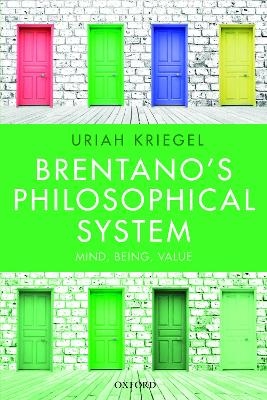
Brentano's Philosophical System
Mind, Being, Value
Seiten
2020
Oxford University Press (Verlag)
978-0-19-885806-5 (ISBN)
Oxford University Press (Verlag)
978-0-19-885806-5 (ISBN)
Uriah Kriegel presents a rich exploration of the systematic thought of the great 19th-century philosopher Franz Brentano, and its importance to the subsequent development of philosophy. Kriegel sets out Brentano's unified theories of the true, the good, and the beautiful in an accessible way.
Uriah Kriegel presents a rich exploration of the philosophy of the great nineteenth-century thinker Franz Brentano. He locates Brentano at the crossroads where the Anglo-American and continental European philosophical traditions diverged. At the centre of this account of Brentano's philosophy is the connection between mind and reality. Kriegel aims to develop Brentano's central ideas where they are overly programmatic or do not take into account philosophical developments that have taken place since Brentano's death a century ago; and to offer a partial defense of Brentano's system as quite plausible and in any case extraordinarily creative and thought-provoking. Brentano's system grounds a complete metaphysics and value theory in a well-developed philosophy of mind, and accordingly the book is divided into three parts, devoted to Brentano's philosophy of mind, his metaphysics, and his moral philosophy. The book's fundamental ambition is to show how Brentano combines the clarity and precision of the analytic philosopher with the sweeping vision of the continental philosopher. Brentano pays careful attention to important distinctions, conscientiously defines key notions, presents precise arguments for his claims, judiciously considers potential objections, and in general proceeds very methodically - yet he does so not as an end in itself, but as a means only. His end is the crafting of a grand philosophical system in the classical sense, attempting to produce nothing less than a unified theory of the true, the good, and the beautiful.
Uriah Kriegel presents a rich exploration of the philosophy of the great nineteenth-century thinker Franz Brentano. He locates Brentano at the crossroads where the Anglo-American and continental European philosophical traditions diverged. At the centre of this account of Brentano's philosophy is the connection between mind and reality. Kriegel aims to develop Brentano's central ideas where they are overly programmatic or do not take into account philosophical developments that have taken place since Brentano's death a century ago; and to offer a partial defense of Brentano's system as quite plausible and in any case extraordinarily creative and thought-provoking. Brentano's system grounds a complete metaphysics and value theory in a well-developed philosophy of mind, and accordingly the book is divided into three parts, devoted to Brentano's philosophy of mind, his metaphysics, and his moral philosophy. The book's fundamental ambition is to show how Brentano combines the clarity and precision of the analytic philosopher with the sweeping vision of the continental philosopher. Brentano pays careful attention to important distinctions, conscientiously defines key notions, presents precise arguments for his claims, judiciously considers potential objections, and in general proceeds very methodically - yet he does so not as an end in itself, but as a means only. His end is the crafting of a grand philosophical system in the classical sense, attempting to produce nothing less than a unified theory of the true, the good, and the beautiful.
Uriah Kriegel received his PhD from Brown University in 2003. He was hired by the University of Arizona that year and tenured there in 2010. Since 2012, he has been a research director at the Jean Nicod Institute in Paris. He is the author of Subjective Consciousness: A Self-Representational Theory (OUP, 2009), The Sources of Intentionality (OUP, 2011), and The Varieties of Consciousness (OUP, 2015).
Introduction: Why Brentano?
I. Mind
1: Consciousness
2: Intentionality
3: The Modes of Conscious Intentionality
II. Being
4: Judgment
5: Metaontology: Existence
6: Ontology: The Existents
III. Value
7: Will and Emotion
8: Metaethics: Goodness
9: Ethics: The Goods
IV. Conclusion
10: Brentano's System: The True, the Good, and the Beautiful
| Erscheinungsdatum | 20.05.2020 |
|---|---|
| Verlagsort | Oxford |
| Sprache | englisch |
| Maße | 156 x 229 mm |
| Gewicht | 490 g |
| Themenwelt | Geisteswissenschaften ► Philosophie ► Geschichte der Philosophie |
| Geisteswissenschaften ► Philosophie ► Philosophie der Neuzeit | |
| ISBN-10 | 0-19-885806-X / 019885806X |
| ISBN-13 | 978-0-19-885806-5 / 9780198858065 |
| Zustand | Neuware |
| Informationen gemäß Produktsicherheitsverordnung (GPSR) | |
| Haben Sie eine Frage zum Produkt? |
Mehr entdecken
aus dem Bereich
aus dem Bereich
eine Geschichte der Zuversicht von Homer bis zum Klimawandel
Buch | Hardcover (2024)
C.H.Beck (Verlag)
CHF 39,20
die kolonialen Wurzeln der französischen Theorie
Buch | Hardcover (2024)
Matthes & Seitz Berlin (Verlag)
CHF 41,90


